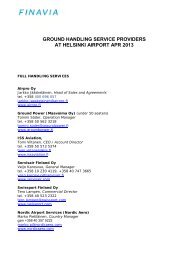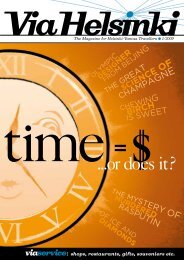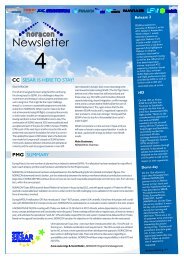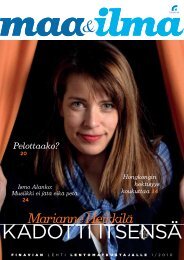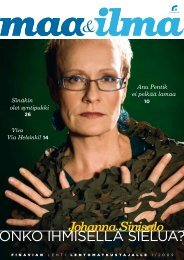You also want an ePaper? Increase the reach of your titles
YUMPU automatically turns print PDFs into web optimized ePapers that Google loves.
a sudden overdose oF BeauTY Can MaKe You<br />
JusT as sICK as an eaTInG BInGe WIll.<br />
20 V I A HELSINKI<br />
How does<br />
food affect us?<br />
Do you order “the usual” or vegetarian on a flight? Do you<br />
think about what you eat? Do you eat healthily? Are there a<br />
lot of additives in your meals? Do you choose low fat prod-<br />
ucts, locally-sour<strong>ce</strong>d or organic food?<br />
We constantly fa<strong>ce</strong> such choi<strong>ce</strong>s. We are drowning in a<br />
sea of comestible data, but it’s inconsistent. Scientific find-<br />
ings and recommendations change all the time with new re-<br />
search, so we feel un<strong>ce</strong>rtain. Am I eating well? It is ever hard-<br />
er to answer this question. There’s an increasing proportion<br />
of additives and genetically modified or otherwise altered<br />
ingredients in our diet and no one knows the consequen<strong>ce</strong>s.<br />
A completely separate question – but just as interesting –<br />
is how the ingredients we eat or drink affect how we experi-<br />
en<strong>ce</strong> the world. Yet one thing is <strong>ce</strong>rtain, they do have an im-<br />
pact. Plant-derived sedatives and drugs have been around<br />
for aeons and people around the world have used them to al-<br />
ter their consciousness. Modern scien<strong>ce</strong> does the same with<br />
synthetic products in particular, such as sedatives and anti-<br />
depressants. We also like to change our consciousness our-<br />
selves and splash out huge sums on stimulants, such as al-<br />
cohol. What does this tell us? Do most of us really want to<br />
escape from our own lives and surroundings for a while?<br />
Not all substan<strong>ce</strong>s blur our sense of reality the way alco-<br />
hol does, and the effect may be the opposite, heightening our<br />
Capital Tastes<br />
COPEnHAGEn 1 hr 35 min<br />
the suc<strong>ce</strong>ss story of Smørrebrød, the<br />
danish sandwich, began in the latter half<br />
of the 19th <strong>ce</strong>ntury, when the copenhagen<br />
offi<strong>ce</strong>rs’ club created the first sandwich<br />
menu. key to Smørrebrød is that you can<br />
be imaginative and relaxed about preparing<br />
them. and you can enjoy them as an<br />
everyday snack, as a main meal, and with<br />
a beer or schnapps. you can pile absolutely<br />
anything you want onto a thin sli<strong>ce</strong><br />
of bread – vegetables, cheese, meat, even<br />
chocolate, fruit salad and whipped cream.<br />
awareness, at least if you believe essayist, novelist and social<br />
critic Aldous Huxley. He became a guinea pig for a research-<br />
er studying the effects of mescaline on the human mind and<br />
on interpretations of external reality.<br />
One May morning in the 1950s, Huxley swallowed 0.4 g<br />
of mescaline in a glass of water. Huxley reported that that<br />
minuscule drop of mescaline taken from the peyote cactus<br />
drastically changed his per<strong>ce</strong>ption of reality, of himself and<br />
his body. He based his world-famous book The Doors of Per-<br />
<strong>ce</strong>ption on his experien<strong>ce</strong>s.<br />
Surprisingly, Huxley did not feel that mescaline fabricat-<br />
ed reality but conversely, it helped him understand its in-<br />
nermost make-up. Encouraged by his experien<strong>ce</strong>s, he asks<br />
in his book whether we actually see the world as it is, at all.<br />
Huxley explains that beluga whales, for example, per<strong>ce</strong>ive<br />
the world in four dimensions and not three, as humans do.<br />
In bats, hearing and touch are combined with sight, so their<br />
awareness of phenomena is more comprehensive than ours.<br />
He believed that the operation of human senses <strong>vi</strong>a the brain<br />
and nervous system tended to eliminate rather than produ<strong>ce</strong><br />
sensation. So, we don’t per<strong>ce</strong>ive everything that exists. Only<br />
part of it filters through to us.<br />
In this other consciousness, the “ego” became less impor-<br />
tant and Huxley says he felt more like a small part of a large<br />
entity. Also, his relationship with his own body changed, as<br />
though he had strayed from his body without identifying<br />
with it. Different things now seemed important and he be-<br />
came more interested in the deep meaning of things. Time<br />
as a phenomenon disappeared, and he noti<strong>ce</strong>d he no long-<br />
Helsinki airport is also a gateway to a world of flavours. The cuisine typical of the pla<strong>ce</strong>s awaiting you at the end of<br />
ViEnnA 2 hr 30 min<br />
a culinary speciality in the cafes of<br />
Vienna is Sachertorte, a chocolate<br />
cake flavoured with apricot jam. this<br />
came into existen<strong>ce</strong>, like diamonds,<br />
under extreme pressure. in 1832, Prin<strong>ce</strong><br />
Wenzel Clemens Metternich ordered<br />
his kitchen staff to produ<strong>ce</strong> a particularly<br />
tasty dessert for some unexpected<br />
guests. when the head chef was taken<br />
ill, his 16-year-old apprenti<strong>ce</strong> Franz<br />
Sacher had to fill in for his boss. the<br />
rest, as they say, is history.



